Comprehensive Guide to Criminal Background Checks
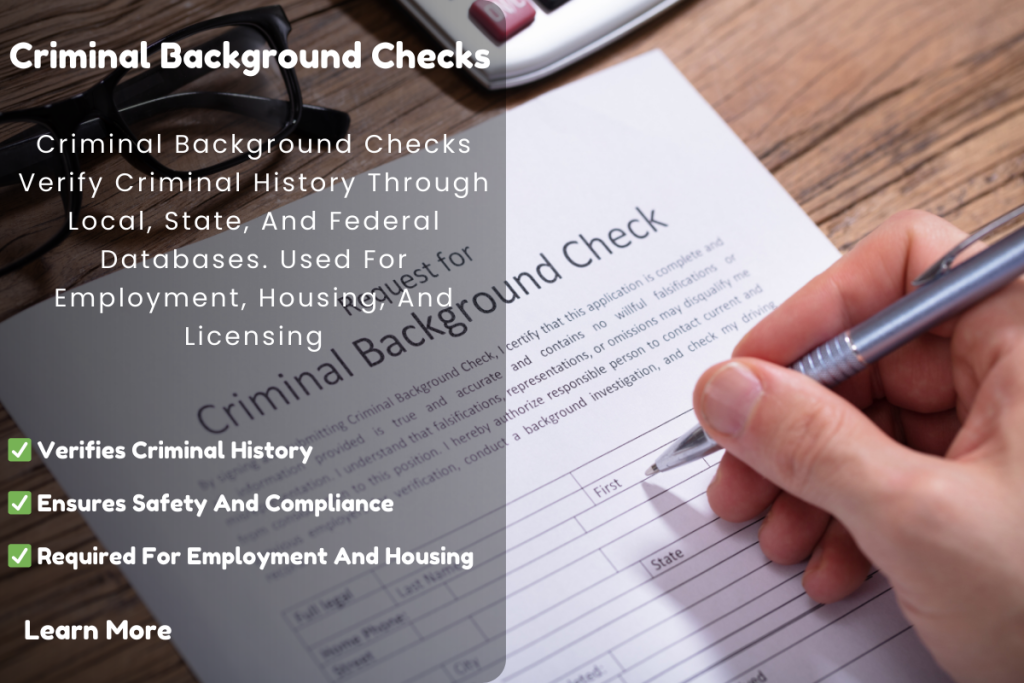
Introduction to Criminal Background Checks
A criminal background checks is a screening process used to investigate an individual’s criminal history. This is a crucial procedure in employment screening, tenant screening, and other scenarios where verifying a person’s criminal record is necessary. It is employed to ensure that individuals are not a potential risk to their community, workplace, or property.
What is a Criminal Background Check?
A criminal background check is a process used to gather and review an individual’s criminal history. The check investigates any past convictions, arrests, and pending charges. This process is necessary for employers, landlords, and other organizations to evaluate whether an individual is a suitable candidate for a role, a rental property, or a specific service. Criminal background checks typically include information about offenses such as theft, assault, drug-related crimes, and other felonies or misdemeanors.
Why Are Criminal Background Checks Important?
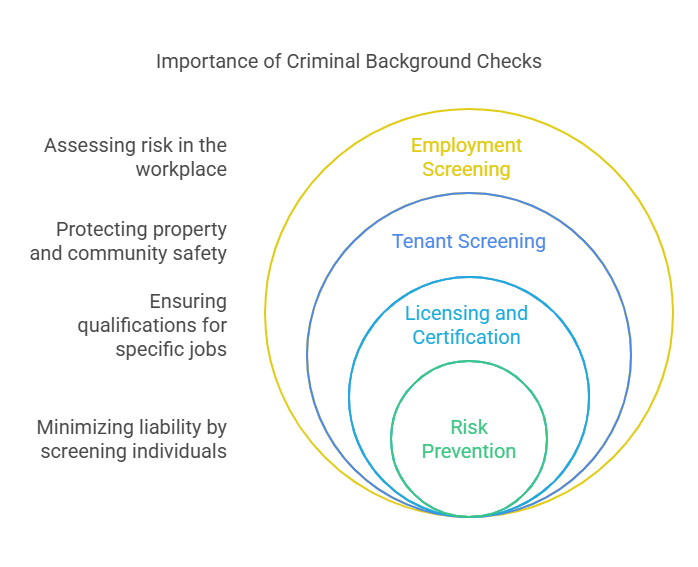
Criminal background checks are essential for several key reasons:
- Employment Screening: Employers rely on criminal background checks to determine whether potential employees have a criminal history that could pose a risk to the workplace. This is particularly important in industries where employees are entrusted with sensitive information or are in close contact with vulnerable populations.
- Tenant Screening: Landlords and property managers often conduct background checks to assess the criminal history of potential tenants. By doing so, they ensure the safety and security of other tenants, the property itself, and the surrounding community.
- Licensing and Certification: Many professions and industries, such as healthcare, education, and financial services, require criminal background checks as part of the licensing or certification process. These checks ensure that only individuals without disqualifying criminal records are approved for specific jobs.
- Risk Prevention: By screening individuals before hiring or renting to them, organizations can minimize the risk of bringing in individuals whose criminal histories may make them a liability.
Types of Criminal Background Checks
There are several types of criminal background checks, each serving a different purpose depending on the level of detail needed and the jurisdiction where the check is being conducted. The most common types of checks include:
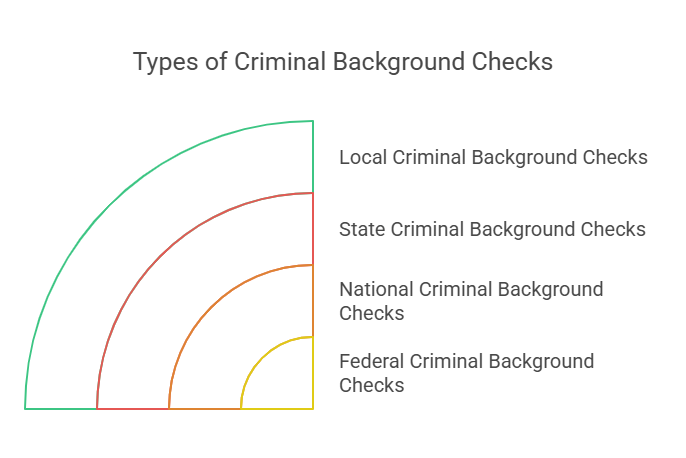
- Local Criminal Background Checks: These checks are typically performed at the county or city level and focus on criminal activity within that specific region. They are often used for smaller or localized searches.
- State Criminal Background Checks: Statewide checks provide a broader scope than local checks and include criminal records from all counties within the state. This type of check is commonly used for individuals who have lived or worked in different areas of the state.
- National Criminal Background Checks: A national background check provides access to criminal records from across all 50 states. This type of check is ideal for employers who want to conduct a more comprehensive search, particularly when the individual has lived in multiple states.
- Federal Criminal Background Checks: Federal checks focus on federal crimes, such as tax evasion, organized crime, and interstate offenses. These checks are particularly useful for positions that require a higher level of security clearance or roles that may involve handling sensitive government information.
Who Requires Criminal Background Checks?
Criminal background checks are commonly required by the following parties:
- Employers: Employers use criminal background checks as part of their hiring process to ensure that prospective employees do not have a criminal record that could compromise the workplace or pose risks to others.
- Landlords and Property Managers: Landlords often conduct criminal background checks on potential tenants to ensure the safety of the property and other tenants. This is particularly important in multifamily housing units or residential areas with high-security concerns.
- Licensing and Regulatory Agencies: Many industries, such as healthcare, law enforcement, and education, require background checks for licensing or certification. These checks ensure that individuals in these fields have not committed crimes that would make them unsuitable for these roles.
- Insurance Companies: In certain cases, insurance companies may request criminal background checks to assess the risk level of potential clients, especially in high-risk industries or roles.
The Criminal Background Check Process
The process of conducting a criminal background check generally follows these steps:
- Consent: Before a criminal background check can be initiated, the individual must provide consent. This is a legal requirement under laws like the Fair Credit Reporting Act (FCRA) in the U.S. Employers and landlords must obtain written consent before initiating a background check.
- Information Collection: To perform the background check, personal information such as the individual’s full name, date of birth, social security number, and address history is typically required. This ensures that the correct records are retrieved.
- Searching Criminal Databases: Once the necessary information is provided, a background screening service will search various criminal databases, including local, state, federal, and national records, depending on the type of check being performed.
- Generating the Report: After the search is completed, a criminal background check report is generated. This report will list any criminal records, including arrests, convictions, and pending charges.
- Review and Decision: The organization requesting the check will review the report and make decisions based on the findings. This could involve rejecting a job application, denying a rental application, or requiring further investigation for a professional license.
The Importance of Criminal Background Checks
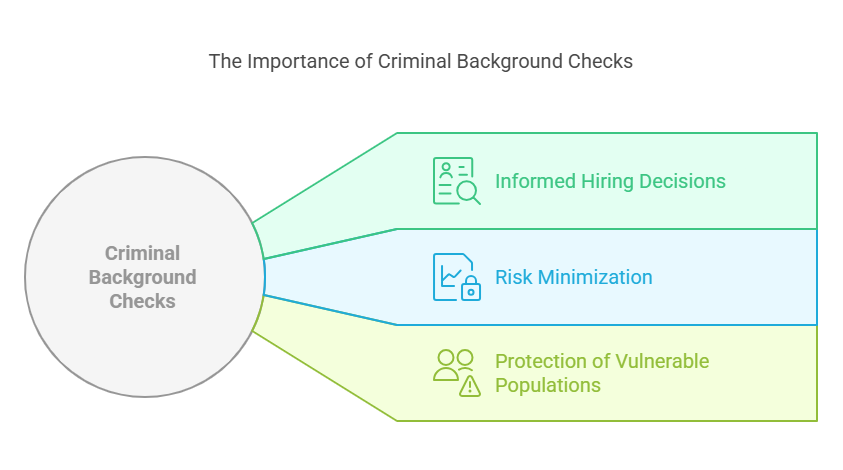
Criminal background checks play a vital role in protecting organizations, communities, and individuals from potential risks associated with criminal behavior. For example, an employer may choose not to hire an individual who has a history of theft or violent crimes, particularly for roles that involve access to sensitive information or working with vulnerable populations. Similarly, landlords rely on background checks to ensure they do not rent to individuals with a history of violence or property damage.
By conducting criminal background checks, organizations can make informed decisions, minimize risk, and protect their employees, tenants, and the public at large.
Key Takeaways
- Criminal background checks are essential for employment screening, tenant screening, and regulatory compliance.
- They are used to evaluate whether an individual has a history of criminal behavior that may pose a risk in a given context.
- There are various types of background checks, including local, state, national, and federal checks, each serving a specific purpose.
- Criminal background checks help employers, landlords, and regulatory bodies make informed decisions that ensure safety, security, and compliance with the law.
Understanding the criminal background check process and its importance helps organizations maintain a safe and secure environment, whether it’s a workplace, a rental property, or a regulated industry.
Types of Criminal Background Checks and How to Obtain Them
Criminal background checks can be classified into various types, each serving a different purpose based on the scope and depth of the investigation. The specific type of background check required depends on factors such as the job role, jurisdiction, and the level of scrutiny needed. Let’s dive into the various types of criminal background checks, their purposes, and how they are obtained.
Types of Criminal Background Checks
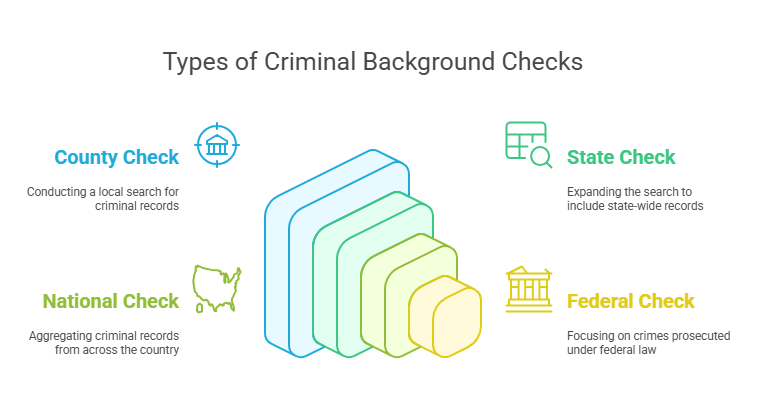
- County (Local) Criminal Background Check
A county-level or local criminal background check focuses on crimes committed within a specific county or city. It is generally the most basic form of criminal background check and is typically used for localized searches. The check pulls records from the local county courts and law enforcement databases, giving a snapshot of criminal activity within that region.
Purpose:
- Used when hiring for roles in specific regions or cities.
- Commonly used in tenant screening by landlords who want to check the local criminal history of applicants.
Obtaining the Check:
- You can request a local criminal background check directly from county courthouses or local law enforcement agencies. Many jurisdictions now offer online systems for querying local criminal records.
- State Criminal Background Check
A state criminal background check offers a broader search than a county-level check. It examines criminal records across all counties within a specific state, providing a more comprehensive view of an individual’s criminal history within that state. It’s often required by employers or landlords when someone has lived in multiple counties or states.
Purpose:
- Suitable for applicants who have resided in multiple counties within a state.
- Often used for employment screening, especially for positions that require a higher level of security.
Obtaining the Check:
- State criminal background checks can be obtained from the state police or the state’s department of justice. Many states allow individuals or employers to access state criminal records online, typically through a state government website.
- National Criminal Background Check
A national criminal background check aggregates criminal records from across the entire United States. This check is ideal for employers or organizations who need a comprehensive search across state lines, particularly when the individual has lived in multiple states. It is especially useful for large corporations or organizations with a national workforce.
Purpose:
- Provides a comprehensive overview of an individual’s criminal history across the entire country.
- Often used in large organizations, particularly those with nationwide hiring needs.
Obtaining the Check:
- National criminal background checks are typically performed by third-party background check agencies that have access to a nationwide database of criminal records.
- These checks may also be requested through private companies or government agencies that collect and maintain national criminal data.
- Federal Criminal Background Check
A federal criminal background check focuses on crimes that have been prosecuted under federal law, such as tax evasion, organized crime, and white-collar crimes. Unlike state and local checks, federal background checks do not include crimes prosecuted at the county or state level.
Purpose:
- Important for roles that require security clearances, such as government positions, high-level finance roles, and jobs involving sensitive information.
- Used for individuals applying for federal positions or those needing access to classified or restricted information.
Obtaining the Check:
- Federal criminal background checks are typically conducted through agencies like the Federal Bureau of Investigation (FBI) in the U.S.
- The FBI’s Identity History Summary check is often requested for detailed federal criminal records, especially for individuals applying for federal positions or jobs requiring high security.
How to Obtain a Criminal Background Check
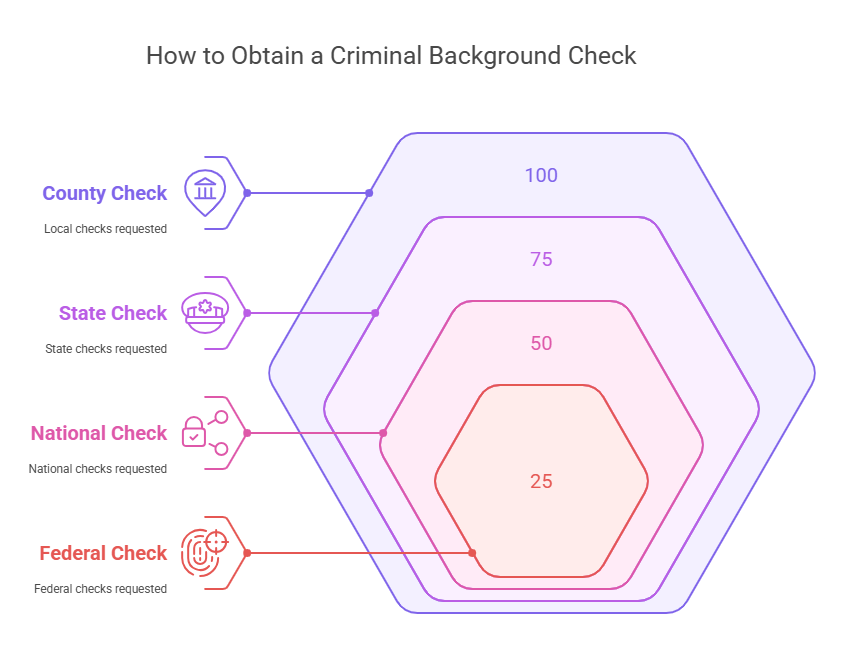
There are several ways to request a criminal background check depending on the type of check required. Here’s how you can obtain each of the various criminal checks:
- County (Local) Criminal Background Check:
- Contact your local county court or law enforcement office directly to inquire about requesting a criminal background check.
- Many counties offer online portals for individuals to access local criminal records or submit requests for background checks.
- State Criminal Background Check:
- Request a check from your state’s police department, state bureau of investigation, or department of justice.
- Many states provide online services where individuals can access their own criminal records or submit requests on behalf of others.
- Employers can also access these checks through state-run databases or through third-party background check providers.
- National Criminal Background Check:
- National background checks can be obtained through private third-party agencies that compile criminal records from various states.
- Employers, landlords, and individuals can access these checks by using background screening services such as those provided by third-party vendors that specialize in nationwide criminal record searches.
- Federal Criminal Background Check:
- To request a federal criminal background check, individuals can contact the Federal Bureau of Investigation (FBI). The FBI provides an Identity History Summary check, which can be used to access federal criminal records.
- The request is usually done via an online portal, and individuals must submit fingerprint cards to complete the check.
Criminal Background Check Process
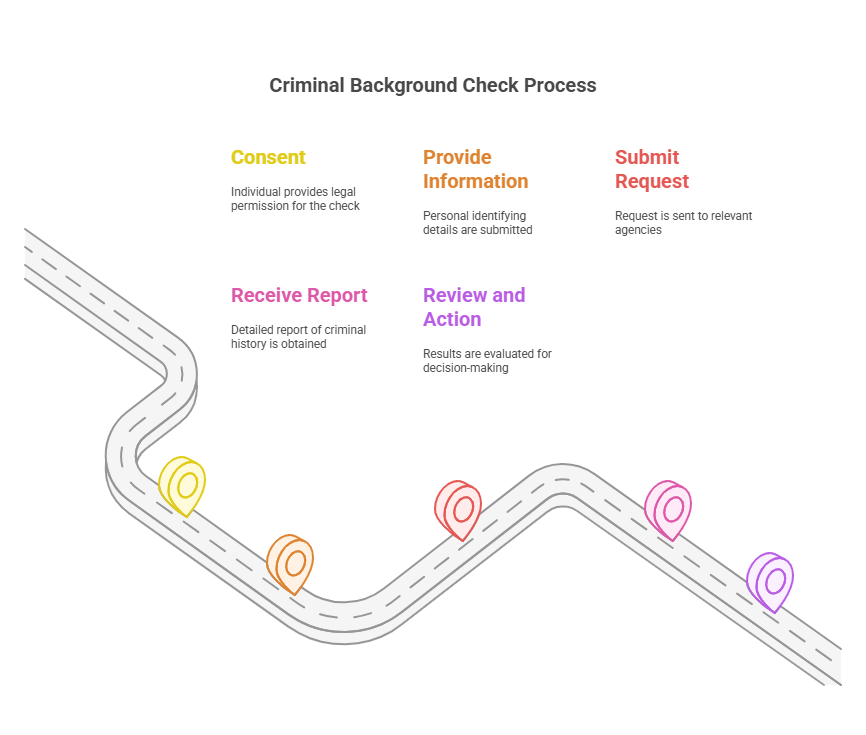
The process of obtaining a criminal background check generally involves the following steps:
- Consent:
- Before performing a background check, the individual must give consent. This is legally required in many jurisdictions, particularly under regulations like the Fair Credit Reporting Act (FCRA) in the U.S.
- Provide Information:
- Individuals will need to provide personal identifying information, such as full name, date of birth, social security number, and past addresses, to ensure that the background check results are accurate and relevant.
- Submit Request:
- Depending on the type of check, individuals or organizations may submit requests directly to relevant agencies (e.g., local police, state authorities, or federal agencies). Many third-party services allow individuals to submit background check requests online.
- Receive Report:
- Once the check is processed, the individual or organization requesting the background check will receive a detailed report outlining any criminal convictions, arrests, or pending charges associated with the individual.
- Review and Action:
- The organization requesting the check will review the results and decide how to proceed based on the individual’s criminal history. In employment or tenant screening, this could influence hiring or rental decisions.
Precisehire and Criminal Background Checks
Precisehire is a background screening service that provides accurate, reliable, and compliant criminal background checks. They offer a variety of background check services, including criminal background screening, employment verification, and other essential checks. With Precisehire, employers and organizations can ensure they are hiring qualified individuals who meet legal and security standards, helping to maintain a safe and compliant workforce.
Using a service like Precisehire provides several advantages, including access to nationwide criminal records, the ability to streamline the hiring process, and ensuring compliance with legal regulations governing background checks.
Comparison Table: Types of Criminal Background Checks
| Type of Check | Purpose | Scope | How to Obtain |
|---|---|---|---|
| County (Local) Check | Local crimes within a specific county or city | Local jurisdiction | Request from local law enforcement or courts. Many counties offer online systems. |
| State Check | Criminal records across all counties within a state | Statewide | Request from state police or department of justice; available online in many states. |
| National Check | Criminal records across all 50 states | Nationwide | Obtain from third-party agencies that aggregate national criminal records. |
| Federal Check | Federal crimes (e.g., organized crime, tax evasion) | Nationwide (Federal jurisdiction only) | Request through the FBI’s Identity History Summary check. |
Legal Aspects of Criminal Background Checks
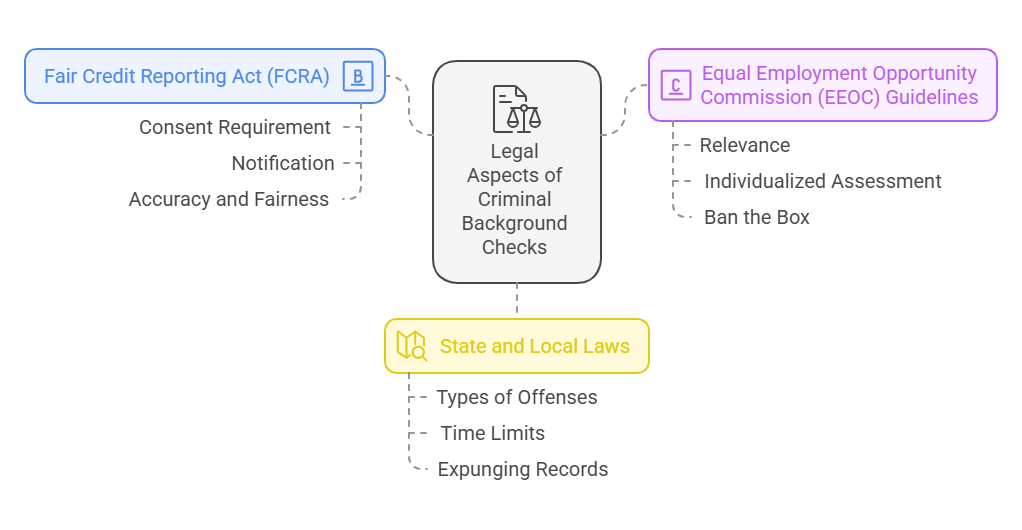
- Fair Credit Reporting Act (FCRA)
In the United States, the Fair Credit Reporting Act (FCRA) plays a significant role in regulating criminal background checks. The FCRA ensures that employers, landlords, and other entities that conduct background checks follow specific procedures to protect the privacy of individuals. Under the FCRA, the following rules apply:- Consent Requirement: Employers must obtain written consent from an individual before conducting a criminal background check. This applies whether the check is being used for employment, tenancy, or any other purpose.
- Notification: If an employer decides to take an adverse action (e.g., not hiring someone or denying a rental application) based on the results of a background check, they must inform the individual. They must also provide a copy of the background check report and a notice of their rights under the FCRA.
- Accuracy and Fairness: Employers and other entities are required to ensure the information they use in background checks is accurate. They cannot use outdated or incorrect data to make decisions that negatively impact an individual’s opportunities.
- Equal Employment Opportunity Commission (EEOC) Guidelines
The EEOC provides guidelines for employers on how to use criminal background checks in a manner that does not discriminate against individuals based on race, color, national origin, sex, disability, or religion. Some key considerations include:- Relevance: Criminal history must be relevant to the position being filled. For example, a conviction for a violent crime might be more relevant for a job in law enforcement than for an office job.
- Individualized Assessment: Employers should conduct an individualized assessment of candidates with criminal records, considering factors such as the nature of the crime, how much time has passed since the offense, and whether the individual has demonstrated rehabilitation.
- Ban the Box: In many states and cities, laws like “Ban the Box” prevent employers from asking about criminal history on initial job applications. These laws are designed to give individuals with criminal records a fairer chance at employment.
- State and Local Laws
In addition to federal regulations, each state and local jurisdiction may have its own laws governing criminal background checks. These laws vary widely and may cover aspects like:- The types of offenses that can be considered during the hiring or rental process.
- The time limits for how far back criminal records can be examined (e.g., many states limit criminal history checks to the past seven years).
- The requirements for expunging or sealing criminal records, which may affect how long an individual’s criminal history is accessible.
Understanding these legal aspects helps ensure compliance and protects both organizations and individuals from potential legal pitfalls when conducting criminal background checks.
Frequently Asked Questions (FAQs)
What can and cannot be considered in a criminal background check?
Employers can typically consider convictions that are directly relevant to the job. For example, a robbery conviction may disqualify a candidate for a position that requires handling money. However, arrests without convictions generally cannot be used to make hiring decisions. Additionally, some states limit the types of offenses that can be used in hiring decisions.
How long does it take for a background check to be completed?
The time it takes to complete a criminal background check depends on the type of check being conducted and the jurisdiction. Local and state checks may take a few days to a week, while federal background checks or more comprehensive national checks may take longer, especially if the individual has lived in multiple locations or has a complex criminal history.
How far back do criminal background checks go?
The length of time a background check will go back depends on the type of check and the jurisdiction. In some states, background checks may go back as far as seven years, while others may allow checks that go back indefinitely. However, employers must comply with state laws and may not consider certain old offenses when making decisions.
Can someone be hired if they have a criminal record?
Yes, someone can be hired even if they have a criminal record, depending on the nature of the offense and the job. Employers must evaluate criminal records on a case-by-case basis and ensure that their hiring decisions comply with EEOC guidelines, focusing on whether the conviction is relevant to the role and if the applicant has shown signs of rehabilitation.
What happens if a criminal background check reveals a mistake?
If a background check report contains incorrect information, the individual has the right to dispute it. Under the FCRA, individuals can request that the background check agency correct any errors in the report. If an employer or landlord uses incorrect information to deny employment or housing, they must provide a copy of the report and allow the individual to dispute the inaccuracies.
Conclusion
Criminal background checks are a vital part of the hiring, tenant screening, and licensing processes, helping to protect employers, property owners, and communities from potential risks associated with criminal behavior. By understanding the types of checks, the process for obtaining them, and the legal framework surrounding their use, employers and individuals can navigate background checks effectively and responsibly.
It is crucial to conduct criminal background checks in a compliant and fair manner, following all applicable laws to ensure that decisions are based on accurate, relevant information. Services like Precisehire help streamline the process by offering reliable, compliant background checks that assist employers and organizations in making informed, legal, and fair decisions.
In summary, criminal background checks offer an essential safeguard against hiring or renting to individuals whose criminal histories may pose a risk. By following best practices, respecting legal guidelines, and making fair decisions based on accurate data, employers, landlords, and organizations can minimize risks and ensure safer and more secure environments for all.
